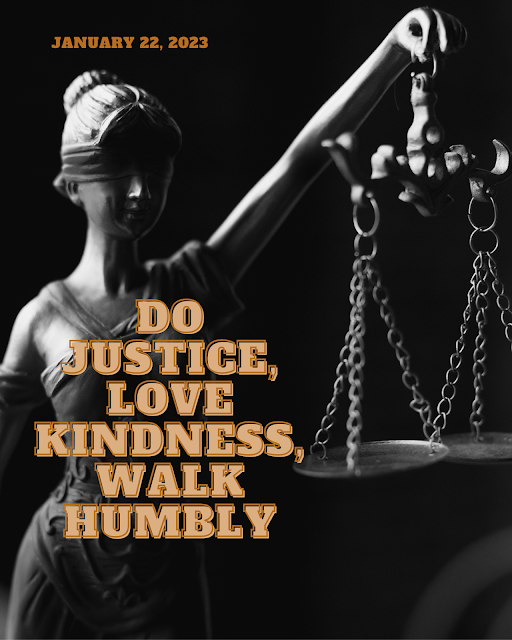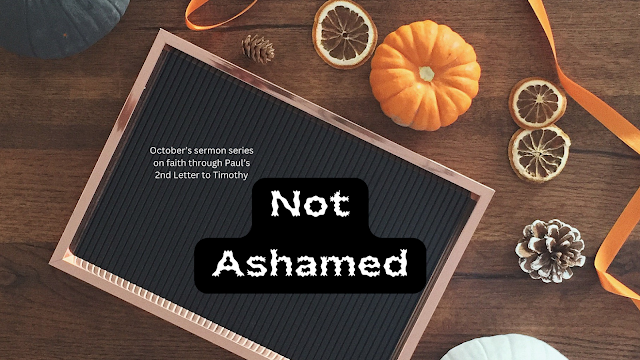Do Justice, Love Kindness, and Walk Humbly - Micah 6:1-8 (Epiphany 3A)
Let’s be honest, I know the title of my sermon gives it away, but I’m going to try really hard not to skip ahead to verse 8 and to focus on the whole text. So let’s start at the beginning - this is one of my favorite verses, so let’s get into it.
Chapter 6 begins with God talking (through Micah) whether it’s a courtroom scene or not (scholars are divided about this). Ultimately - the fundamental relationship between God and people has been broken and God is trying to figure out what to do… how can God and the creation come back together in harmony?
God is challenging Israel in their present trouble. This isn’t a challenge where judgment is the end of the line, although it feels like it, doesn’t it? From Israel’s position, it feels to them like God has been silent all this time. But God responds with having them recall the exodus from Egypt, when the Lord redeemed them as they were slaves. The Lord provided for them with Moses and his family, and then also the miraculous crossing of the Jordan from Shittim to Gilgal (found in the Book of Joshua).
In verse six, Israel changes their approach from inquisitive to humble and reverent. Israel is feeling like they need to make a sacrificial offering to God in appeasement. But what do they suggest? The suggestions then start from the normal (for the time) to the absurd - to the firstborn children of the community, thinking that such a great sacrifice was needed to make God happy.
But the God of Micah, who is the same God we are worshipping this morning, has none of that. God doesn’t want their sacrifice, he wants them to stop complaining and be grateful with what they have been given. The idea that Israel has a right to demand all of this from their God is kind of extraordinary, you know? God is handling this pretty well, comparatively to the gods of Greece and Rome. He is interacting directly with them, instead of sending some sort of stand-in, who would probably be ineffective. He also doesn’t dismiss or minimize their concerns. Sometimes we just need reminding of the promises and how they’ve been fulfilled in our lives. Listening to Mary Ann this morning is a great example of that!
If Christian ethics had to be boiled down to a phrase, which we modern people really love to do, the eighth verse would really work great. “What does the Lord require of you but to do justice, and to love kindness, and to walk humbly with your God?” This is really a theme that runs throughout not only the prophets of the Old Testament, but was written into law on those tablets with the commandments, and came to life in the shape of Jesus Christ. How many other catchy things have we tried to get out there into the wider world? I remember back in the 90s, the bracelets were everywhere - especially when I was in middle school - the “What Would Jesus Do?” Or WWJD bracelets? Or how we try to spout creeds and find purpose in so many things but then it passes as quickly as it takes for our phones to ring.
Let’s get into this a little deeper - let’s break it down a bit. When it says require - that seems to be harsh and unyielding. Require is a big word, right? Rev. James Howell wrote about this, and he says, “It isn’t that God is insisting or demanding these things from us, it is more that he Yearns or needs it as a partner - like a child requiring its parent’s love - or like a shepherd seeking a lost sheep - or like a flower needing the sunshine” Being a requirement is more like it can’t be separated. Basically, it boils down to what is essential to faith - do justice, love kindness, and walk humbly with your God. I want you to hang on to that. Keep that phrase in your mind for next week when Pastor Steve is here, preaching on the Beatitudes, when Jesus is teaching about how there is mercy for those who may not seem like they would get it by normal human means. This is why Jesus turns everything upside down.
Let’s get back though to Micah. The three sections of this are - doing justice, love kindness & walking humbly with your God. I’m sure I could write separate sermons about each of these, but I want to touch on them briefly. Doing justice - what does that even mean, you might be wondering? Isn’t that just charity or politics or something? This is a very important question. We are in this weird place in all of those realms where churches are to do justice, and government has taken over some of those services, but due to cost, they are pulling back on those, so in some cases there are gaps in care. The church has been shrinking, so we have less ability to fill in those gaps, among a societal shift towards seemingly away from this sacred work. Charity lessens suffering, but doesn’t address the underlying problems. Charity has its place, but isn’t it the point of justice to make charity unnecessary? Justice is about building communities of caring - where God’s idea of worth is central, not people’s. Politics is a means to an end of justice, but at the same time, there are limits on that as well, because there are so many interests there that a political victory sometimes very little to build communities who care to solve problems, just throwing band-aids on problems so that the complaining stops.
Love kindness seems like it’s straightforward but there is a connection between here loving neighbor and loving God as well, just as Jesus taught us. Giving yourself to others, especially those who are needier than you, is bringing justice, love, and being connected to God. Loving kindness means that no matter what people are doing to you, kindness is what is being extended back because you love the other person for their humanity. You control what you are able to do, and so, it does take work, and is difficult - don’t get me wrong - but we are all sinners, but at the same time, we are all children of God, and he wants to reconcile with all of us. We need redemption and some may not even realize it. Kindness is in our control and giving mercy instead of anything else is what we can offer as followers of Jesus Christ.
Walking humbly with your God - this one seems straightforward too but let me spin it in a way that may make you think about it. When we walk humbly - we are walking attentively, paying attention to how God is leading us… and when you walk WITH someone, you have to be conscious of their speed, how strained their breathing is, you need to pay attention. This has to do with each of our journeys… even beyond this church, or even our expression of God.Like it says in the apostles creed, I believe there is one God, and in the divinity of Jesus Christ, but unlike that - I believe that these things have also been discerned in different cultures in different ways. We need to be able to openly listen to others and their experiences and in earnest they will listen to us. Christians tend to close doors when we are confronted with differences, thinking our way is superior. Each of us have had an encounter with the divine - i hope - but others have too in different ways. I don’t believe that those encounters are wrong, and maybe we have something to learn. Let us be open to hear where God can be found, regardless of what the source is. The more we have the conversations, the more God we can find! How incredible that can be!
As many of you know, my uncle Bob passed away on Christmas Eve. He was my dad’s oldest brother, 10 years difference. At the service, the pastor said that these verses were Bob’s favorite. He had an incredible life and was passionate at so many things - an embodiment of a renaissance man. He studied engineering, served in the army in nuclear corps, came home and worked in an engineering firm where he rose through the ladder and ended up as their president. But he never forgot to know everyone’s name at the company picnic. He created community around him, whether it was at his church, or as an active genealogist - in his travels that way. He will be missed, by me, and everyone else that knew him. He was a joker and a storyteller, sometimes you couldn’t tell where the joke ended and the story began, but he was an incredible man. Someone I’d love to have one more conversation with, but that’ll have to wait a while, God willing.
Justice seems to be controversial now but look how far it goes back. Justice is a word that has been thrown around a lot in recent years. It has become a rallying cry for movements and protests, and it has also been used to justify violence and hatred. But what does justice really mean? And where does the concept of justice come from?
The Bible is one of the oldest sources of human law and justice. Throughout the Old Testament, we see God calling his people to live in a way that is just and fair. This includes laws that protect the poor and vulnerable, laws that promote fairness in business dealings, and laws that punish crime.
The New Testament also emphasizes the importance of justice. Jesus taught his followers to love their neighbors as themselves, and he showed them what this meant by demonstrating compassion and empathy for the marginalized and oppressed. He challenged the powerful and spoke up for the voiceless.
Christian theology teaches that justice is not just about fairness and equality; it is also about reconciliation and restoration. When we do justice, we are not just restoring the balance of power; we are also working to heal the brokenness in our relationships with God and with each other.
Justice is a core value of the Christian faith. It is something that God himself cares deeply about, and it is something that he calls us to participate in.
Why is Justice Controversial Now?
There are a number of reasons why justice has become such a controversial topic in recent years. One reason is that the definition of justice is itself contested. Some people believe that justice is all about fairness and equality, while others believe that it is more about compassion and mercy.
Another reason for the controversy surrounding justice is that it is often seen as a zero-sum game. In other words, people believe that for one person to get justice, another person must lose something. This can lead to resentment and anger, and it can make it difficult to find common ground.
Finally, justice is often used as a political weapon. Politicians and pundits on both sides of the aisle use the word "justice" to justify their own agendas, and this can make it difficult for people to have a meaningful conversation about the issue.
How Can We Move Forward?
Despite the challenges, the pursuit of justice is still worth fighting for. Here are a few suggestions for how we can move forward:
- Start by defining justice for ourselves. What does justice look like to us? What values are important to us?
- Listen to others. We need to be willing to hear different perspectives on justice, even if we disagree with them.
- Engage in civil discourse. We need to be able to discuss justice respectfully and productively.
- Take action. We can't just sit around and talk about justice; we need to take action. This could involve volunteering for a local organization, writing to our elected officials, or simply speaking up when we see injustice.
The pursuit of justice is a long and difficult journey, but it is one that we must undertake. By working together, we can create a more just and equitable world for all.
Conclusion
Justice is a core value of the Christian faith, and it is something that God himself cares deeply about. In recent years, the concept of justice has become increasingly controversial, but this does not mean that we should give up on the pursuit of justice. We must continue to work towards creating a more just and equitable world for all.
May God bless you as you seek to do justice, love kindness, and walk humbly with your God.




Comments
Post a Comment